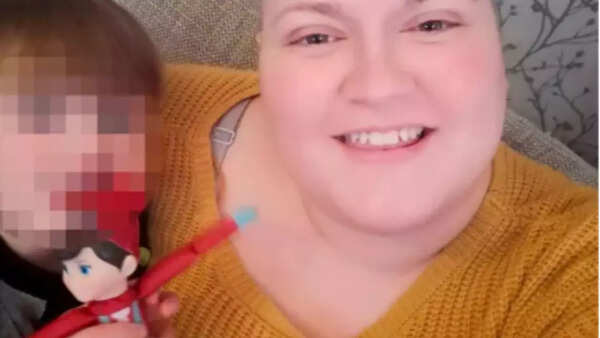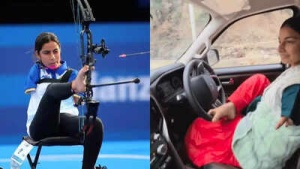A 28-year-old mother from Leeds, Georgia Gardiner, is facing a devastating prognosis after her initial symptoms of nausea, stomach cramps, and loss of appetite were misdiagnosed as acid reflux. Despite numerous visits to her general practitioner (GP) and local hospital, her concerns were dismissed, and she was prescribed antacids.

After months of persistent advocacy, further testing revealed the shocking truth: Georgia had linitis plastica, a rare and aggressive form of stomach cancer. This type of cancer, sometimes called "leather bottle stomach," causes the stomach lining to thicken, impairing its function.
By the time of her diagnosis on June 13, 2024, the cancer had already metastasized to her lymph nodes and other organs. Doctors have given her just 12 months to live, focusing treatment on managing her symptoms and improving her quality of life.
"I felt invincible. I never thought that I would develop cancer at 28. My world fell apart when I was informed that it is incurable," Georgia shared.

Georgia is now determined to make the most of her remaining time with her fiancé, Callum Scott, and their two-year-old son, Arlo. They have accelerated their wedding plans, prioritizing creating lasting memories.
"The thing that breaks me is how much I’ll miss in Arlo’s life. He gives my life purpose," she said, resolute in battling the cancer "in every way possible."

Georgia is using her experience to urge others to trust their instincts and advocate for thorough testing when they suspect something is wrong.
"Had I been taken seriously sooner, perhaps we could have nipped it in the bud before it spread. I just want others to get it in time," she explained.
Her message is a powerful one: Don't ignore persistent symptoms, and don't hesitate to demand answers from medical professionals.
Linitis Plastica is a rare adenocarcinoma affecting the glands of the stomach lining. It leads to stiffening and thickening of the stomach walls, often referred to as "leather bottle stomach." Due to its rapid progression and subtle early symptoms, diagnosis often occurs at an advanced stage.
Unfortunately, the aggressive nature of linitis plastica makes it difficult to cure, particularly after it has spread beyond the stomach wall.
The exact cause of linitis plastica remains unknown. However, it is strongly associated with diffuse-type gastric adenocarcinoma. In some instances, genetic mutations, specifically in the CDH1 gene, have been implicated. This gene mutation is linked to hereditary diffuse gastric cancer (HDGC), significantly increasing the risk of developing linitis plastica.
Other contributing factors may include:
These factors can contribute to the development and progression of this aggressive form of stomach cancer.
Newer articles
Older articles
 Evil Eye Amulet: Protective Charm or Portal to Dark Forces? A Cultural Debate
Evil Eye Amulet: Protective Charm or Portal to Dark Forces? A Cultural Debate
 Jayden Seales Fined by ICC for Provocative Gesture During Australia Test Match
Jayden Seales Fined by ICC for Provocative Gesture During Australia Test Match
 Paralympic Archer Sheetal Devi's Viral Video Shows Her Driving Car with Feet, Defying Expectations
Paralympic Archer Sheetal Devi's Viral Video Shows Her Driving Car with Feet, Defying Expectations
 Broad Slams India's Team Selection After Headingley Test Loss, Calls for Roster Tweaks at Edgbaston
Broad Slams India's Team Selection After Headingley Test Loss, Calls for Roster Tweaks at Edgbaston
 Umpire Controversy Erupts: West Indies Coach Sammy Questions Holdstock's Consistency in Barbados Test
Umpire Controversy Erupts: West Indies Coach Sammy Questions Holdstock's Consistency in Barbados Test
 Sachin Tendulkar: 1983 World Cup Win Sparked My Cricket Dream at Age 10
Sachin Tendulkar: 1983 World Cup Win Sparked My Cricket Dream at Age 10
 Jaiswal's Fielding Woes: Ex-India Star Kaif Points to Potential Cause for Dropped Catches in England Test
Jaiswal's Fielding Woes: Ex-India Star Kaif Points to Potential Cause for Dropped Catches in England Test
 Team India's England Tour: Rahul's Sleep Strategy, Coaching Rituals, and Coffee Culture Revealed
Team India's England Tour: Rahul's Sleep Strategy, Coaching Rituals, and Coffee Culture Revealed
 Suryakumar Yadav Successfully Completes Sports Hernia Surgery, Eyes Return to Cricket
Suryakumar Yadav Successfully Completes Sports Hernia Surgery, Eyes Return to Cricket
 Gujarat Cricket Set to Launch T20 League in 2025-26 Season
Gujarat Cricket Set to Launch T20 League in 2025-26 Season